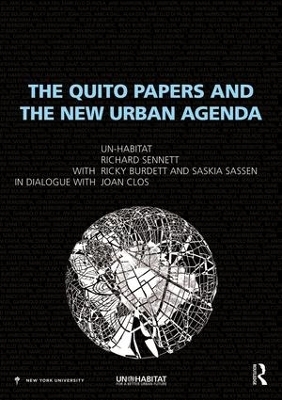
The Quito Papers and the New Urban Agenda
Routledge (Verlag)
978-0-8153-7929-4 (ISBN)
The purpose of The Quito Papers and the New Urban Agenda is to start a discussion that both challenges this status quo and opens up new lines of enquiry. It intentionally does not propose a manifesto made up of simplistic slogans and recommendations as cities in the 21st century are more fragile and complex. Its content, therefore, is intentionally broad, ranging from architecture, planning and urban design, to land ownership and regulation, water management and environmental philosophy. This multifaceted assembly of perspectives critiques the tenets of the Charter of Athens, identify new trends and propose new insights on contemporary urbanization.
Part One outlines the overall challenges facing cities in the 21st century and Part Two offers a number of conceptual frameworks and approaches for dealing with those challenges. Each Part is also composed of a body of illustrated arguments, synthesized from selectively-abridged background papers from over 15 commissioned authors, interspersed with in-depth papers.
Richard Sennett, Professor of Humanities, New York University, Professor of Sociology, The London School of Economics and Political Science Ricky Burdett, Professor of Urban Studies at the London School of Economics and Political Science and the director of LSE Cities and the Urban Age project Saskia Sassen, Robert S. Lynd Professor of Sociology at Columbia University Joan Clos, Under-Secretary General and Executive Director of the United Nations Human Settlements Programme (UN-Habitat)
Preface: Why The Quito Papers? Introduction. 1: Forces Shaping 21st Century Urbanization. Introduction. The Universe of Cities. 1.1: Growing differences in population dynamics require focus and speed-differentiated approaches to good urbanization. 1.2: A massive loss of habitat is accelerating and driving new flows of migration. 1.3: Large-scale urban land acquisitions could de-urbanize cities and undermine public control. 1.4: Lack of access to water and the risks caused by an excess of water require a rethinking on the place and shape of future urbanization. 1.5: If democracy is to survive it will have to resist internal populism and embrace external cooperation. Who Owns the City? 2: The Science of Urbanization and the Open City. Introduction. 2.1: Good urbanization requires a three decade time horizon, a focus on value creation, capture and sharing and a compact between all levels of government. 2.2: Open-system thinking and designing allow cities to evolve and change. 2.3: Contemporary urbanism provides the opportunity to set aside the blank slate for an ethic of cohabitation. 2.4: Planning and design should operate at both metropolitan and neighbourhood scales and provide adaptable interventions that bridge social inequalities. 2.5: UN-Habitat’s Sample of Cities shows that contemporary patterns of urbanization can reap greater benefits. 2.6: Integrative networks combine government- and self-led approaches and expand the right to the city. 2.7: Commons can compensate for public/private deficiencies if they achieve sufficiently large-scale application in cities. 2.8: Planning without democracy or democracy without planning? How cities might have it both ways. The Open City. On Redistribution Policies and their Impact on Good Urbanization. Contemporary Urbanism. A Conversation.
| Erscheinungsdatum | 29.03.2018 |
|---|---|
| Zusatzinfo | 126 Halftones, color |
| Verlagsort | New York |
| Sprache | englisch |
| Maße | 210 x 297 mm |
| Gewicht | 780 g |
| Themenwelt | Naturwissenschaften ► Biologie ► Ökologie / Naturschutz |
| Naturwissenschaften ► Geowissenschaften ► Geografie / Kartografie | |
| Sozialwissenschaften ► Soziologie ► Spezielle Soziologien | |
| Technik ► Architektur | |
| Wirtschaft ► Volkswirtschaftslehre | |
| ISBN-10 | 0-8153-7929-3 / 0815379293 |
| ISBN-13 | 978-0-8153-7929-4 / 9780815379294 |
| Zustand | Neuware |
| Haben Sie eine Frage zum Produkt? |
aus dem Bereich


